There’s one vitamin that every vegan has to be meticulous about incorporating in their diet: Vitamin B-12. Infamous in the community, this vitamin is mostly found in eggs, meat, and dairy products, making it an area of concern for those in the circle trying to get all the vital nutrients they need. Vitamin B-12 is not a one-off vitamin that is unnecessary; disregarding it can lead to harmful effects on the body. You will need it to actively lead a healthy life. Below is all the info you’ll need when considering your diet.
What is Vitamin B-12?

Vitamin B-12 is an integral tick on the to-eat list for your body. As an essential nutrient, it is needed to develop red blood cells, sustain your nerves, and normalize your brain function. B-12 deficiency can have adverse effects on the brain and overall body, making this nutrient an absolute need.
What Kinds of Food Contain Vitamin B-12?
Vitamin B-12 is present in all sorts of meats and eggs. Liver, chicken, and beef are particularly rich in vitamin B-12. Additionally, seafood such as fish, clams, and shellfish carry lots of this nutrient. Dairy products like low-fat milk, cheese, and yogurt also contain this vitamin.
What is Vitamin B-12 Deficiency?
Vegans, and some vegetarians, run the risk of developing Vitamin B-12 deficiency. Because the nutrient is more common in foods that are not part of these diets such as eggs and dairy, you are prone to having low amounts of the vitamin. This can lead to anemia and can cause damage to the nervous system.
Adults can have any of these symptoms that signal a lack of vitamin B-12: numbness, reduced sensitivity to pain or pressure, blurred vision, sore tongue, poor memory, strange gait, confusion, tingling, loss of energy, and personality changes.
Many of these symptoms can also be due to other illnesses; however, if you are a vegan or vegetarian and you know what you have been eating for the past few days, you will most likely have a picture of whether you have taken enough vitamin B-12. It is advisable to consult a healthcare provider if you suspect you have this condition.
The kinds of vegans and vegetarians who need to be careful about lacking this nutrient come in two types. First are the long-term vegans who do not eat fortified foods. These are otherwise called raw food vegans or macrobiotic vegans. The other group is mothers who do not have enough vitamin B-12 for themselves, thus creating a deficiency upon breastfeeding their babies.
What Can You Do to Get Vitamin B-12 If You’re A Vegetarian?
Since vegetarians have a wider selection of food— most choosing to eat dairy products— these veggie lovers can still enjoy a large consumption of vitamin B-12 in eggs, yogurt, cheese, fortified cereals, and creamy soups. Fortified cereal stands out because it is accessible and the vitamin itself does not need to be broken down for you to be able to consume it. Since many of those available on the market are plant-based, most vegans can also include fortified cereals in their diet.
What Can You Do to Get Vitamin B-12 If You’re A Vegan?
First and foremost, the popular choice with vegans comes in the form of vitamin B-12 supplements. It is a surefire way to get your dose of the essential nutrient. For those who do not subscribe to taking these pills, there are other viable options too.
An equally famous vitamin B-12 source is nutritional yeast both vegans and vegetarians consider for their dose of vitamins. This can be added to all sorts of meals such as plant-based pasta and cereals as well as fresh salads and tofu.
Some other ways to go about it are through eating meat substitutes, fortified non-dairy milk, breakfast cereals, and vegan spreads. The key here is to check the nutritional value of the food to make sure you are taking some vitamin B-12.
Additionally, some seaweed, mushrooms, and algae can have the nutrient. Unfortunately, research shows that these are not very reliable as vitamin B-12 sources.
How Much Vitamin B-12 Do You Need?

The recommended intake differs across countries. In the United States of America, 2.4 micrograms a day is the standard set for adults while 2.8 micrograms are needed for breastfeeding mothers. Germany, on the other hand, suggests 3 micrograms a day. This all depends on how much your body can absorb in the first place and these recommendations are based on the idea that you can absorb at least 50%. The less frequently you consume the vitamin the more your body has to catch up and gain more of it, thus making a healthy amount per day very important.
Final Thoughts
Every person needs to look out to make sure they have a balanced diet and ensure they can take all the nutrients they need. For vegans and vegetarians, this might take an extra step because of the limitations of only eating plant-based food; however, this also means you are more conscious of the vitamins you need. Vitamin B-12 is one of the hard ones to keep track of in the community but there are ways around it. Nutrient yeast and fortified cereals as well as supplements are all options to consider in your vegan journey.


